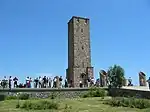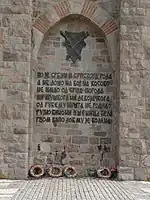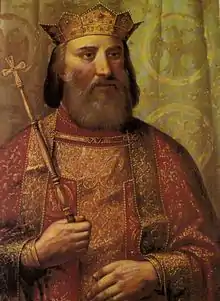The Kosovo curse (Serbian: Косовска клетва / Kosovska kletva) or Prince's curse (Serbian: Кнежева клетва / Kneževa kletva), is according to legend, a curse said by Serbian Saint Lazar Hrebeljanović before the Battle of Kosovo. Lazar curses those Serbs who ignored his call for war against the Ottoman Empire.[1] Constantine of Kostenets recorded that Lazar issued "invitation and threat" to Serbian states which is preserved in the Serbian epic poetry in the form of the curse.[2]
From 1778 to 1781, Avram Miletić composed a miscellany of 129 songs (Serbian: Песмарица/Pesmarica) which also included the song "A history of Musić Stefan" containing a form of the Kosovo curse.[3] One form of the curse appeared in the 1845 edition of the collection of Serbian folk songs by Vuk Karadžić. It is an updated version of an 1813 text by Karadžić with stronger nationalist overtones.[4]
Karadžić's "Kosovo curse" is inscribed on the Gazimestan monument, where the Battle of Kosovo was fought.
Text of the curse


| Serbian Cyrillic | Serbian Latin | English |
|---|---|---|
| Ко је Србин и српскога рода, и од српске крви и колена, |
Ko je Srbin i srpskoga roda, i od srpske krvi i kolena, |
Whoever is a Serb and of Serb birth, And of Serb blood and heritage, |
See also
References
- ↑ "NIN" (2940–2948). 2007.
Најпознатија клетва у Срба свака- ко је "Кнежева клетва" у којој се цар Лазар уочи Косовског боја обраћа Ср- бима, позивајући их на саборност у одбрани
{{cite journal}}: Cite journal requires|journal=(help) - ↑ "Letopis Matice Srpske". 193–196. 1898: 147.
{{cite journal}}: Cite journal requires|journal=(help) - ↑ "Istorijski Glasnik". 1984: 45.
У песми коју је забележио Аврам Милетић кнез Лазар је проклињао: „Ког ујутро на Косову не буде, не родило му ни жито ни
{{cite journal}}: Cite journal requires|journal=(help) - ↑ Greenawalt, Alexander (2001). "Kosovo Myths: Karadzic, Njegos, and the Transformation of Serb Memory". Spacesofidentity.net. doi:10.25071/1496-6778.8045. Retrieved 2 January 2012.
